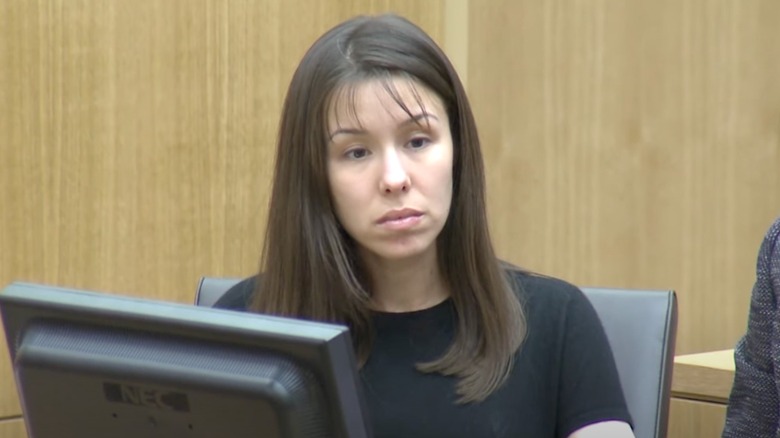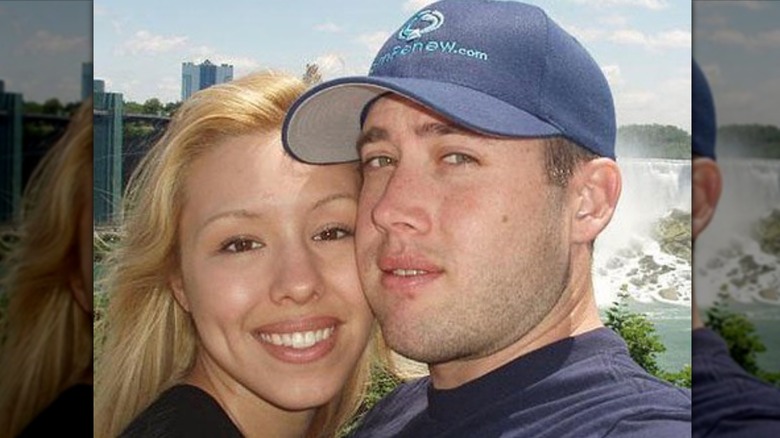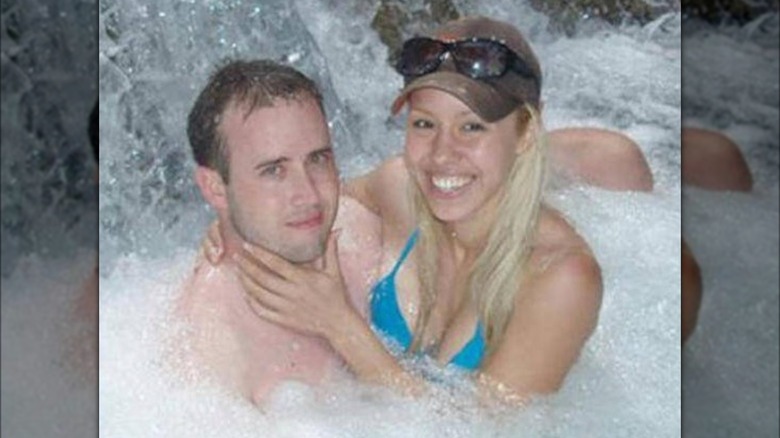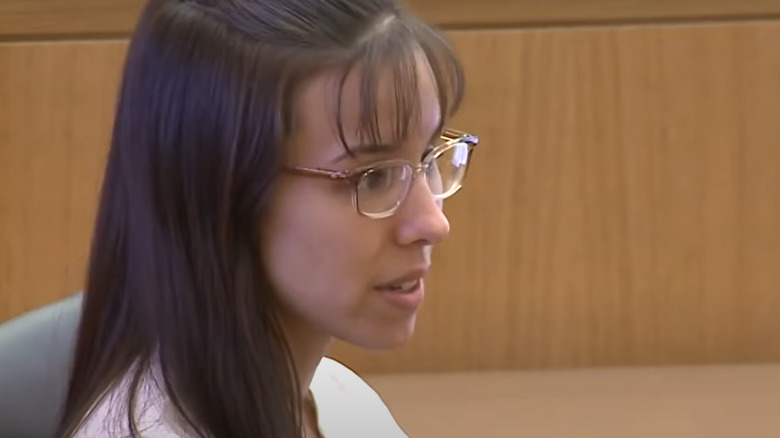The Interviews That Destroyed Jodi Arias' Chance At Freedom
Jodi Ann Arias sounded confident, even with jailhouse bars separating her from her interviewer. The subject was the murder of her on-again, off-again boyfriend, Travis Alexander. He'd been found dead and mutilated on June 9, 2008, and Arias was arrested for the crime a month later. Her interview, with Inside Edition, came that September. Though police said that her bloody palm prints were found at the scene of the crime, Arias stuck to her story. At one point, she told the interviewer, "No jury can convict me ... I am innocent."
Arias made other claims, to "Inside Edition" and to "48 Hours" a few months later; that Alexander was the victim of a home invasion, that both of them had been attacked by a masked man and woman, that she'd fled the scene and had been too terrified to call the police. "I'm not proud of that at all," she said, but she didn't waver from her central point: "I know I am innocent, God knows I am innocent, Travis knows I am innocent."
Unfortunately for Arias, many observers, including the prosecution, considered her story incongruous with the evidence. When the case came to trial, nearly five years after Alexander was murdered, Arias's "Inside Edition" and "48 Hours" interviews were played in court, the latter representing the first time in the program's history that its reporting was used as evidence in a trial. The interviews proved valuable in showing that, in the details, Arias's story varied considerably with each new telling, and that contrary to her predictions, a jury could and would find her guilty.
Jodi Arias's story changed many times
In the months immediately following Travis Alexander's murder, Jodi Arias was far from a reluctant interviewee. At times, she seemed keen to seek attention, whether it be through interviews on national television or prison contests. Prosecutor Juan Martinez hoped that by comparing Arias's bold statements to the media at the time of her arrest with the evidence and her later accounts, he would discredit her on the witness stand.
It wasn't difficult to poke holes in the story Arias gave to the press. Her claim in interviews — that masked intruders attacked her and murdered Alexander — was itself the second version of events she'd given out. Her first story was that she wasn't even in the same town as Alexander when he died. Arias switched to a third version of events as her trial date approached: she admitted to killing Alexander, but only in self-defense. Alexander, she now claimed, was an abusive partner who had been violent toward her throughout their relationship, and he was coming at her in a rage when she shot him.
That was the story she came to the witness stand with, and Martinez pressed her on the obvious discrepancies between that story and what she'd told the press at the time of her arrest. "Her fear and her panic about what had happened led her to tell different stories," claimed her defense attorney (via CBS News), but Arias had no choice but to admit she'd lied and been unable to keep her story straight.
Arias's lies tripped up her defense expert
When asked why she never reported Alexander for abuse, Jodi Arias said, "I would've never called the police on Travis," via CBSNews. But her tale of violence at Travis Alexander's hands, culminating in a fight for her life and shooting in self-defense, wasn't convincing to Alexander's friends and family, who said that no one but Arias had ever accused Alexander of something like that. Friends who followed the trial were further appalled when Arias claimed to have found a photo of a young boy in his underwear in Alexander's bedroom, insinuating that he was a pedophile.
The prosecution didn't accept her claims either, and they used Arias's latest story to weaken a key element of her defense. One of the experts called by Arias's lawyers was Dr. Richard Samuels, who tested Arias and diagnosed her with post-traumatic stress disorder. But his diagnosis was based on her earlier story of having escaped an assault by two masked intruders. When the prosecution pointed this out, Samuels conceded, "Perhaps I should have re-administered that test."
Another expert witness for the defense was Alyce LaViolette, a specialist in domestic violence. LaViolette accepted Arias's story and repeated alleged incidents between her and Alexander. But the prosecution accused LaViolette of bias, and its own domestic abuse expert testified that, based on the number of times Arias had changed her story, any "significant" abuse was unlikely.
The jury itself questioned Arias's honesty before sentencing
As Jodi Arias's 18-day media circus of a trial wound to a close, attorney Linda Kenney Baden took her long history of shifting claims and aimed it right at the jury. "Some defendants are manipulative," she said. "And ... they think they can manipulate the police ... they also think they can manipulate the courtroom. And that's the problem. You can't manipulate everybody."
The jury didn't have to take Baden's word for it. With Arizona being one of three states allowing jurors to question witnesses, they had plenty of questions of their own to put to Arias. Among other issues, they raised the fact that Arias seemed to seek out publicity despite claiming that she feared revealing the nature of her relationship with Travis Alexander, and one juror directly questioned her about the gaps between her early interviews and her courtroom testimony. "After all the lies you have told," they asked, "why should we believe you now?"
Arias's answer, per CBS News — that she only lied to protect herself or Alexander's reputation — wasn't enough. She was found guilty of first-degree murder after three days of deliberation, and 11 out of 12 jurors favored the death penalty. That, Arias told reporters, was her preference; "I believe death is the ultimate freedom," she said, "so I'd rather just have my freedom — as soon as I can get it." But because the jury couldn't reach a unanimous decision, Arias was automatically given life in prison.



